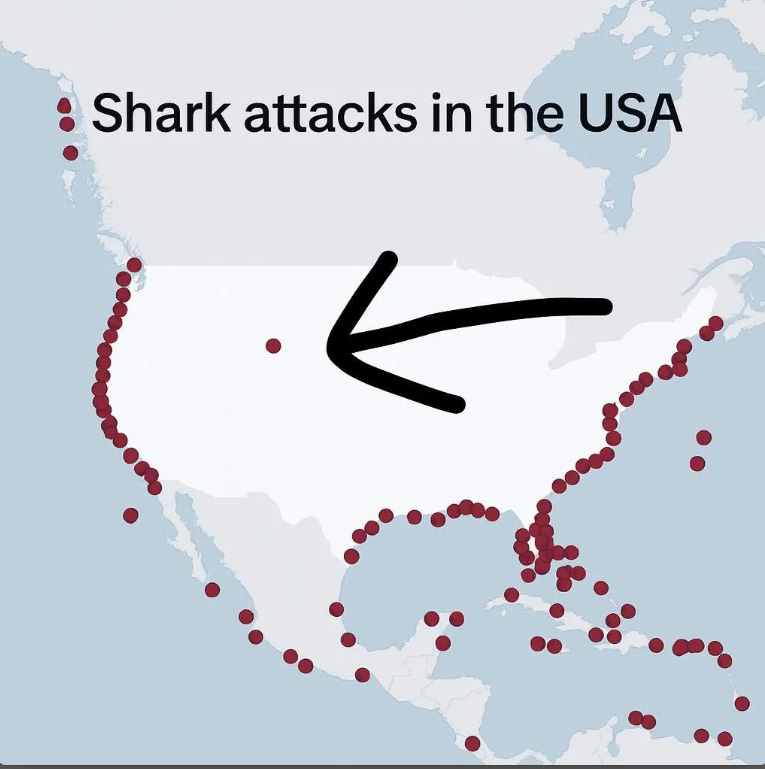Why AI Thinks Sharks Live in Kansas (And What That Means for Your Business)
How a simple map of shark attacks reveals the trillion-dollar blind spot in artificial intelligence
I was scrolling through LinkedIn when I saw it: a map showing every shark attack in the USA. Little red dots scattered along the coasts, clustering heavily in Florida, a few sprinkled up the California shore.
And then I saw it.
A lonely red dot sitting smack in the middle of what looked like Kansas.
My brain did something in 0.3 seconds that would make ChatGPT have an existential crisis: I laughed and thought, "Sharks don't live in corn fields, you idiot."
That moment crystallized something I've been thinking about for months as I watch companies throw billions at AI initiatives. We're building incredibly sophisticated systems that can process terabytes of data, recognize patterns across millions of variables, and make predictions that would take humans years to calculate.
But they can't tell you when something is obviously, hilariously wrong.
The Kansas Shark Problem
Let me tell you about the time I built an AI that confidently predicted snow storms in Miami.
I was working with a weather prediction model for a logistics company. The AI was trained on decades of meteorological data, satellite imagery, and atmospheric pressure readings. It was supposed to help optimize shipping routes by predicting weather patterns.
The model was beautiful. Elegant. Mathematically sound.
It was also completely insane.
The AI kept flagging Miami for "high probability winter storm events" because it had somehow learned to associate certain atmospheric pressure patterns with snow, regardless of geographic location. When I dug deeper, I discovered the training data included weather stations that had been mislabeled—Arctic research stations coded with tropical coordinates.
The AI processed this garbage data with the same confidence it processed everything else. It never stopped to ask the question any human would ask immediately: "Why would it snow in Miami?"
This is what I call the Kansas Shark Problem: AI systems that are simultaneously incredibly smart and spectacularly stupid.
The Map That Broke My Brain
Back to that shark attack map. Let's talk about what your brain did when you saw it, versus what an AI would do.
Your brain (in 0.3 seconds):
Scanned the coastlines: "Yep, that's where sharks live"
Noticed the Florida cluster: "Of course it's Florida"
Spotted the inland dot: "Wait, what the hell?"
Applied basic logic: "Sharks need water. Kansas has no ocean. Error detected."
What AI would do:
Process all coordinates as equally valid data points
Calculate statistical distributions across all locations
Create predictive models including "Midwest Shark Zone"
Generate recommendations for shark insurance in agricultural areas
Never question why Jaws is hunting in wheat fields
The difference isn't just academic. It's the difference between intelligence and processing power.
The $100 Million Muffin Mistake
The examples of AI being confidently wrong are everywhere once you start looking:
Keep reading with a 7-day free trial
Subscribe to BSKiller to keep reading this post and get 7 days of free access to the full post archives.



